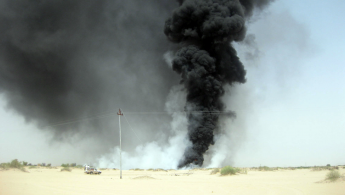Yemen economy in freefall as oil crises bite
Yemen economy in freefall as oil crises bite
A fall in global oil prices and sabotage of pipelines has pushed country to the edge as its budget deficit widens.
2 min read
Sabotaging oil lines has caused oil production in Yemen to drop [AFP]
Yemen is facing a double economic whammy with two thirds of its oil production capacity lost since 2011 and a global oil producers' war that has led to a 40 percent fall in prices.
Oil is a key driver of Yemen's economy. It is responsible for 63 percent of government revenue, 90 percent of the country’s exports, and 25 percent of its GDP.
The global fall in oil prices has largely been blamed on the larger members of Opec pricing out new competition from US shale oil producers.
Oil markets in Asia were volatile on Monday 15 December, when the global price of Brent crude dropped to nearly $60 a barrel. This happened after the International Energy Agency (IEA) cut its oil demand forecast for 2015.
Ali Saif Kulaib, the dean of the faculty of economics at Sanaa University, said Yemen had experienced a near two-third cut in production since the start of the revolution - from 480,000 barrels a day before the start of the revolution in 2011 to 105,000bpd in mid-2014.
The bombing of oil pipelines by rebel groups has been blamed for much of this decline, which is estimated to have cost the country more than $7bn in lost revenue.
A November report by the Yemen central bank stated that oil revenues were $1.34bn between January and September - $660m decline compared to the same period last year.
Economists say that the production decline and the fall in prices is a double disaster for Yemen which has forced the government to use its foreign currency reserves to address a growing fiscal deficit. This year's budget deficit has now reached 8.3 percent ($3.15bn) of GDP.
In an exclusive statement to al-Araby al-Jadeed, a source from the central bank predicted the budget deficit would reach 9.5 percent in 2015.
Analysts say that without the income from oil, Yemen would be unable to pay 95 percent of state employees wages. Furthermore, Gulf states, led by Saudi Arabia, stopped financially supporting their poverty-stricken neighbour after the Houthis seized control of state institutions last September.
This article is an edited translation from our Arabic edition.
Oil is a key driver of Yemen's economy. It is responsible for 63 percent of government revenue, 90 percent of the country’s exports, and 25 percent of its GDP.
The global fall in oil prices has largely been blamed on the larger members of Opec pricing out new competition from US shale oil producers.
Oil markets in Asia were volatile on Monday 15 December, when the global price of Brent crude dropped to nearly $60 a barrel. This happened after the International Energy Agency (IEA) cut its oil demand forecast for 2015.
Ali Saif Kulaib, the dean of the faculty of economics at Sanaa University, said Yemen had experienced a near two-third cut in production since the start of the revolution - from 480,000 barrels a day before the start of the revolution in 2011 to 105,000bpd in mid-2014.
The bombing of oil pipelines by rebel groups has been blamed for much of this decline, which is estimated to have cost the country more than $7bn in lost revenue.
A November report by the Yemen central bank stated that oil revenues were $1.34bn between January and September - $660m decline compared to the same period last year.
Economists say that the production decline and the fall in prices is a double disaster for Yemen which has forced the government to use its foreign currency reserves to address a growing fiscal deficit. This year's budget deficit has now reached 8.3 percent ($3.15bn) of GDP.
In an exclusive statement to al-Araby al-Jadeed, a source from the central bank predicted the budget deficit would reach 9.5 percent in 2015.
Analysts say that without the income from oil, Yemen would be unable to pay 95 percent of state employees wages. Furthermore, Gulf states, led by Saudi Arabia, stopped financially supporting their poverty-stricken neighbour after the Houthis seized control of state institutions last September.
This article is an edited translation from our Arabic edition.



